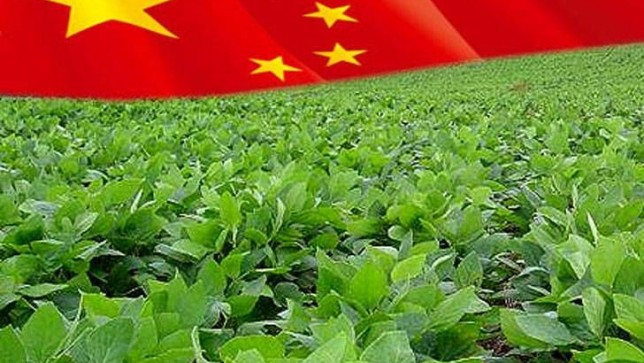– Chinese Report Shows High Levels of Glyphosate in Imported GM Soybeans (Sustainable Pulse, May 19, 2014):
China each year imports a few dozen million tons of GM soybeans. They are predominantly glyphosate-tolerant RR soybeans, processed in China mainly to extract soybean food oil.
Source: China Food Economy Website Report, May 12: ”Agricultural Chemical Residuals Have Been Detected in Food Products Processed from Imported GM Soybeans”.
Chinese: www.cfqn.com.cn/industry/2014/0512/article_33586.html
English translation: blog.sina.com.cn/s/blog_4bb17e9d0102edo8.html
As a glyphosate-based herbicide is repeatedly sprayed during their cultivation, this inevitably causes the RR soybeans to contain certain levels of glyphosate and AMPA, secondary metabolites of glyphosate. The Radiation Medical Science Research Institute of the Chinese Academy of Medical Science and the Beijing Union Hospital commissioned a third party qualified institution to analyze the agricultural chemical residues contained in soybean food oil and soy sauce processed from GM soybeans.
The agricultural chemical residues found in RR soybeans imported from Argentina were: Glyphosate 3.908 mg/kg and AMPA 3.364 mg/kg, which indicates that the level of agricultural chemical residue contained in imported GM soybeans is rather high.
It is normally understood that glyphosate is a herbicide strongly soluble in water, therefore extracted oil can not contain such agricultural chemical residues. However, AMPA, glyphosate’s secondary metabolite, due to its free amino acid, has a certain degree of affinity with the carboxyl of fatty acids. Based on such analysis and also given that stomach discomfort develops after consuming dishes cooked with GM soybean food oil, we carried out an agricultural chemical residue analysis of GM soybean food oil, and as result did not detect glyphosate in GM soybean food oil, but for the first time detected a 0.06mg/kg level of AMPA in GM soybean food oil.
As China does not have stipulations on agricultural chemical residue levels contained in GM soybean food oil, this means that according to international standards agricultural chemical residues are not allowed to be detected in GM soybean food oil. Therefore, there is now a rather clear conclusion over the issue of “GM soybean food oil safety,” i.e. it’s harm to health is not from micro levels of gene residues, but from agricultural chemical residues.
In order to further verify the harm caused by GM soybean processed food products to the national health, the institute carried out analysis of samples of soy sauce purchased at the supermarket. These samples specified that the raw material is soybeans but the label did not specify whether or not the raw material was GM soybean. The analysis result indicated that the agricultural chemical residues of such soy sauce respectively were: 0.133 mg/kg of Glyphosate and 0.089 mg/kg of AMPA. The total amount of these two agricultural chemical residues contained in soy sauce amounts to 3.33 times the level of agricultural chemical residues contained in GM soybean food oil, which obviously causes great harm to the health of consumers.
Relevant epidemiological studies indicate developments of about 70% of tumors are related to agricultural chemical residues contained in food. Therefore we can say for sure that a considerable ratio of tumors in patients is caused by agricultural chemical residues contained in food. Therefore it is impossible that the constantly increasing incidence of tumors in China is not related to the promotion of imports and the processing of GM soybeans for food products to be consumed in China. Therefore, it is suggested that China must, as soon as possible, implement governance over food safety issues caused by imports and consumption of GM soybeans and their processed food products.
This report follows another Chinese report from April 25. The paper ‘We Must Face the harm caused by imported GM soybeans to 1.3 billion Chinese people’ written by Mi Zhen-yu, was published by the “Science & Technology Abstracts Newspaper”. This newspaper, is under the leadership of the Ministry of Science & Technology of China.
It was also announced in May that the Chinese army has ordered all military supply stations to only allow the purchase of non-GMO grain and food oil due to health safety concerns over GMOs.
